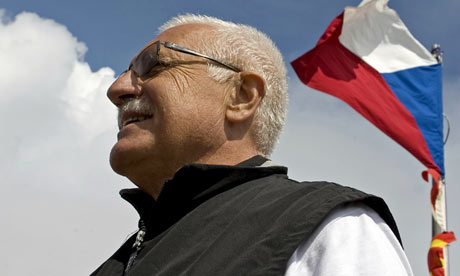• President's last-minute call outrages EU leaders Václav Klaus, president of the Czech Republic, is the strongest Eurosceptic in office in the EU. Photograph: Petr Josek Snr /Reuters Vaclav Klaus, the anti-EU president of the Czech Republic, today moved to re–open the union's ill-starred Lisbon treaty, stirring exasperation in Brussels, Berlin, and Paris by demanding that Prague be granted exemptions from parts of the reform blueprint. The Irish voted by two to one last week to endorse the treaty and Poland's president, Lech Kaczynski, is to sign the charter tomorrow, raising hopes in Brussels that the new deal will be in place within weeks and implemented from the end of the year. But although the treaty has been ratified by the two houses of the Czech parliament, Klaus, as fierce a critic of the reforms as Britain's Conservatives, stuck to his opposition today. He told the president of the European parliament, Jerzy Buzek, that he wanted the treaty reopened to secure an exemption from the charter of fundamental rights which is appended to the treaty. EU officials and diplomats reacted with outrage and the Czech prime minister, Jan Fischer, appeared dumbfounded by the demand. None of the 27 EU governments wants to reopen the treaty. Klaus, as head of state in a parliamentary system, is not empowered to negotiate the treaty. Member states and Brussels are desperate to get the treaty in place before the UK election next year, to lessen the chances of a referendum on the document in Britain. The Conservative party leader, David Cameron, has pledged to stage a referendum if he takes office with the treaty not fully ratified. Much is at stake, with Brussels and national capitals consumed by manoeuvring for the plum jobs up for grabs under the Lisbon treaty: Europe's first president, a new foreign policy supremo, a host of second-tier positions, and the make-up of a new European commission. Tony Blair is the frontrunner for the Europe president job, although he faces stiff opposition and senior sources say that in Brussels the favourite rarely wins. Britain's ambassador to the EU, Kim Darroch, Blair's former European adviser in Downing Street, is said to be lobbying strongly for the former prime minister. "He's Blair's campaign manager," said a senior EU source. President Nicolas Sarkozy of France has been supportive of the Blair bid, but is said to be getting cold feet because of ambivalence from the re-elected German chancellor, Angela Merkel, whose say will be decisive. She is hedging her bets. The Blair camp wants a strong figure, arguing that the choice of president will send an important signal of EU strength or weakness to the rest of the world. But with the role and powers of the post left open, the Germans are believed to favour someone who would not be too assertive. "The heads of government don't want a strong president, someone who could overshadow them," said a veteran architect of German European policy. The three Benelux countries are strongly opposed to Blair, and Poland and Spain are lukewarm. The Dutch prime minister, Jan-Peter Balkenende, is a contender from the centre-right, while Paavo Lipponen, the former Finnish prime minister, may be a candidate from the centre-left. The Scandinavian looks likely to fail, since another Nordic figure, Anders Fogh Rasmussen, of Denmark, has just been made the new Nato chief. "It's between Blair and Balkenende," said the source. "But it all needs to be sorted as part of a package." The former German official agreed that Blair should beat Balkenende. José Manuel Barroso, the re-elected commission chief, stressed that rather than being seen as president of Europe, or Europe's paramount leader, the new post should be confined to the European council, which groups national governments from the member states. But he denied there would be "turf wars … It's not a zero sum game. That's a mean way of looking at things. I sincerely hope there will be a strong president of the European council." The timetable for agreement is slipping, however, as the haggling intensifies. Sweden's prime minister, Fredrik Reinfeldt, is to chair a European summit at the end of the month, but has told EU leaders that a consensus on the new posts is unlikely by then and may have to wait until December. Klaus's demand today also offered a way out of the ratification impasse. Britain and Poland already have "opt-outs" from the Lisbon treaty's charter of fundamental rights, secured during the negotiations in 2007. Klaus said he wanted the same, although Prague did not ask for that during the negotiations. Rather than reopening the Lisbon treaty, the EU leaders could quickly offer the Czechs a political formula in return for ratification.Lisbon treaty turmoil as Czechs demand opt-out
• Desperate rush to ratify before British elections
Sunday, 11 October 2009
Posted by
Britannia Radio
at
08:24
![]()





















